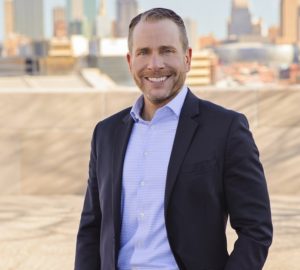Denis O’Brien [0:37]
Welcome to Episode 192 Savvi Financial. Hey, money clan a very warm welcome to the Chain of Wealth podcast. I’m your host Denis O’Brien.
Katie Welsh [0:49]
And I’m Katie Welsh.
Denis O’Brien [0:50]
So Katie, so happy that we could have Brian on from Savvi Financial they’re currently sponsoring the podcast.
Katie Welsh [0:56]
Yeah, it was actually really nice to get to talk to him because it really put a voice to the product.
Denis O’Brien [1:3]
Yeah, for sure. And Kate, something I really like about this company’s mission and why they have been such a great partner with Chain of Wealth is we have the same shared vision of helping people to understand their money problems. And that really strikes home for me.
Katie Welsh [1:45]
Agreed.
Denis O’Brien [1:17]
Yeah, so if you guys haven’t already, don’t forget to join our Facebook community. You can head on over to chainofwealth.com/group and come and say hi. Alright Kate, you ready to dive right in.
Katie Welsh [1:29]
Yeah.
Denis O’Brien [1:29]
Fantastic. Let’s do it.
Voice Over [1:32]
Welcome to chain of wealth. here’s your host, Denis inspiring you to begin your journey of financial freedom.
Denis O’Brien [1:45]
Brian Harrison has two decades of financial services experience as a financial advisor, leader, and division head. Brian is the president and head of consumer product for Savvi helping to grow and develop the platform. A Native of the Boston area. Brian holds degrees from Middlebury College and the MIT Sloan School of Management, and the CFP CLU CHFC and CLTC designations. Welcome Brian.
Katie Welsh [2:16]
Hey Brian.
Brian Harrison [2:17]
Great to be here. Thanks for having me.
Katie Welsh [2:19]
Yeah, of course. We’re glad you’re here. So when we were digging around and doing a little research about you, we noticed something a bit. That caught us off guard.
Brian Harrison [2:31]
Okay. I usually tell people to stay off the internet. There are a lot of Brian Harrison’s out there.
Katie Welsh [2:38]
So are you going to admit to being the lead singer of a band?
Brian Harrison [2:44]
I was the lead singer of a band. And I will say that being in the advisory business for so long, I’m licensed and registered. And I will say that by far that was my favorite disclosure that if you went into the FINRA website and looked me up on broker check, you’d see lead singer, rock band, non investment related. I don’t know if anyone checked me that thoroughly. But no, it was a labour of love but needless to say, did not pay the bills like helping people with their money did but yes, now I can. I can confirm the rumors that you know, during the week I had my my suit and my tie and my yellow pad. And then on the weekend I put product in the hair and you know, dressed up like it was 1984. And, you know, liveed my dream. But yeah, so the rumors are true. It does not affect my ability to help lead Savvi and help people to make smart decisions through our tool. But Yep, yep. It is true.
Denis O’Brien [4:8]
That is really cool.
Katie Welsh [3:42]
I love that, for the fact that my brother is in the finance world. And Denis is also like a financial professional and everything and picturing either one of them doing anything that I’m going to say like fun and exciting. I can’t even imagine somebody like that. Being a lead singer of a rock band. So
Brian Harrison [4:8]
Well, I will tell you, I’ll tell you one quick story before we jump in. I, we used to do weddings. So yes, I was the Wedding Singer, right. So we’re walking off the stage at a at a wedding in Boston, where we’re based and this guy stops me. He’s like, Hey, man, you’re great. I’m like, Thank you said but you know, you don’t look like a rock star who like Oh, thanks. He’s like, you look like an accountant. And I thought well, close. You know, not quite an accountant. But I just look like one and yeah, during the week this is I couldn’t fake Rockstar enough the week of you know, working in this business had stuck to me. So yeah no, looks like an accountant. Worked with people’s money. And yes, to get to rock out over the weekend.
Denis O’Brien [4:49]
That’s really cool.
Katie Welsh [4:50]
You know, everybody has to have their side hustle.
Brian Harrison [4:53]
They do they too much more fun than driving, driving Uber.
Denis O’Brien [4:56]
Yeah definitely.
Brian Harrison [4:58]
I sang along with the radio in Uber, I’d get one star every time. So you know, this was this was definitely, definitely a good move for me.
Denis O’Brien [5:6]
So Brian Savvi has sponsored a few episodes on Chain of Wealth. So firstly, thank you for that. But today, we wanted to have you on the show to chat a little bit about something that Savvi does really well. And that’s budgeting. So
Brian Harrison [5:20]
Sure
Denis O’Brien [5:21]
I know, this is sort of a big topic area and Savvi and Savvi helps people really realize their goals. So why would you say that a budget is such a critical thing to sort of start setting up?
Brian Harrison [5:33]
Well, the first thing when I think about budget is people start to cringe. Like, you know, budget means eating your vegetables, right? And I know with knowing your story, and what you’re able to achieve, you know, it’s tough to take that first step to say, Okay, I have to even just the word budget, the association with it is like, Oh, no, this is a client said to me once does this mean I can’t go out for pizza on Friday nights anymore. So, but it’s critical. And so when we think of the really the mission of Savvi, you know, Savvi is not just about eating your vegetables, when it comes to your finances, it’s about helping you achieve what you want to in life. So when we think of budgeting, it’s not about you know, you can only have three lattes this week, instead of four. It’s really about getting a handle on where your financial life is day to day, week to week, month to month, as the baseline for where you can plan. And in our tool, it’s really a organized function where we bring your accounts together. But I think just as a philosophy, and I think that budgeting sometimes gets a bad name, because it’s punitive by its notion. But, you know, budgeting is just really about setting the groundwork to do the exciting stuff. And you know, budget can be about the fun things, it can be about the vacations it can be about saving for new homes, and, and finally paying off those student loans. Not just about, you know, too many lattes in a week, which you know, think we’re all guilty of. So, you know, I think it’s it’s critical for Savvi, because, you know, before we start planning about college education and the retirement, it’s really got to be about Okay, well, let’s day to day, week to week, where’s my money going?
Katie Welsh [7:12]
I love that you address the fact that when people think about a budget, it’s usually with a negative connotation. We’ve talked to a lot of people who when they say they talk about a budget, or they bring it up with people, it’s immediately perceived as negative. And it shouldn’t be because it’s helping getting your life in order to be able to do those exciting things, like you said.
Brian Harrison [7:39]
Yeah, I would agree. I mean, I we look at it with Savvi, and the first exercise we have people do is to organize all their accounts. And that can actually be a positive experience. Because when you start to see it’s like, oh, you know, I I have this much in my 401k. And I, you know, I do have this savings. And you know, even where you’re spending it can be that wake up call. Right? Okay. Wow, I had no idea was spending so much on clothing. But it does build up a sign, right? It’s about Okay, now that I know all this. Now I can take action. But yeah, it doesn’t have to be punishment. For sure.
Denis O’Brien [8:14]
Yeah, I also think that if you are budgeting, you know, like, one of the best things you can do, if you haven’t budgeted before, is just turn it on. And then just go go about your life, like forget about it, like, turn it on, and have a month’s worth of data and after that month and then come back and reassess and say, Okay, well, I brought home x, where did it go? Why did it go there? And
Brian Harrison [8:40]
Sure
Denis O’Brien [8:40]
You know like it sort of puts you in a position of empowerment, instead of actually a position of restriction saying, Oh, well, I shouldn’t have four lattes, I should only have three this week. Because knowing where your money is going, really is the key to actually building up wealth over a long period of time. And it also puts you in a position where, you know, you’re cognizant of what your money is doing for you.
Brian Harrison [9:4]
Without a doubt. And I think, when we think of budgeting, and even the way that we approach, just general spending, within Savvi general spending is the sort of catch all for where your money goes. And we’re actually in maybe this is, you know, some people want you to get down to the micro management level of your budget, you know, months and weeks and days are going to are going to vary, right? You know, you’re going to have one month where maybe you do go out a few more times in another month where you hunker down and eat a little more ramen, and mac and cheese. But, you know, overall, it has an impact. And I think for those who don’t understand the importance of a budget or having a plan, when you’re just completely burying your head in the sand, that’s when real problems and you wake up a year later and think, oh, my goodness, how did I get into $20,000 of credit card debt? And how did I end up with, you know, no savings at the end of the year? So yeah, it’s critical. So we agree that, that budgeting is critical, but it doesn’t have to be difficult.
Katie Welsh [10:0]
So I’m curious to know, what your opinion on how critical is budgeting similar to achieving a goal like buying a house?
Brian Harrison [10:11]
Sure, well, you know, with anything, or with any financial planning, it’s about trade offs, right? A Savvi, our tool is really built on this is not this idea, but really the process of optimization. So it’s not to say, you know, you could have 10 lattes a week. But is it worth that trade off of not buying a house until, you know, a year later? It’s like, no, like, I’ll, I’ll make my own coffee, because I really want to buy that new home, I need to have that down payment saved. So, you know, is you know, with anything in planning, it’s so tied together. And when we look at it, and we see the complexity of how people think of a budget in a vacuum, okay, well, what’s my monthly budget, what comes in in the beginning of the week, and what goes out or beginning of the month, end of the month. But it’s so interrelated, because even the small choices you make in your budget, they might mean buying that new home, or having to wait another six months. So when you ask the question, it’s not really an either or because I think when we look at it, we see wow, you know, everything is so interrelated. So the choices I make with my budget, yeah, they’re, they’re going to affect my long term goals. Sometimes profoundly. And it’s hard to think of when it’s just that those day to day month to month choices, but they can add up and make a big difference.
Denis O’Brien [11:27]
Yeah, it’s, it’s actually crazy. So Kate, and I were in a very different position to where we were two years ago, you know, we we had a ton of debt,
Katie Welsh [11:35]
Hold on, hold on, we did not. Denis had none. And I had enough for like five people.
Brian Harrison [11:44]
Okay
Denis O’Brien [11:45]
Right. But we sort of knuckled down together. And, you know, we tried to take on this debt. And really, through leaps and bounds and blood, sweat, and tears, we managed to pay off all of Kate’s debt, within two year period, I covered a lot of the fixed costs, and she was just making these straight payments to debt just to try and get rid of everything. But you know, like, going back to budgeting and how my points is relevant is I logged on to Savvi and I was like alright, well, I’ll next thing is we want to buy a house, you know, and we want to save up for down payment, and, you know, Savvi pop in all my information. And it then asked me what my goals were and what I was looking to achieve. And I was like, Oh, well, I want to save for a down payment on the house, this is a perfect cuz this is exactly where I’m at. And I put in my information. And I said how much I want to spend on the house. And it popped out that it didn’t say to me, oh, you need to spend this much money and save this and whatever else. It sort of said to me, you know, like you’re on track, you’re doing the right thing, keep going, how you’re going, and you will be able to buy a house, by the time you want to buy a house.
Katie Welsh [12:51]
It was very reassuring,
Denis O’Brien [12:53]
It was a very empowering feeling. Because, you know, like, we talk about budgeting how you know, people think it’s so restrictive. But on the flip side, if you actually, like aware of what your money is doing and how it’s working for you, it can do the complete opposite, I can give you so much control of what you’re doing.
Brian Harrison [13:10]
Right. And you know, it’s interesting, you mention control, because like our mission, when we built this tool, was about giving people control over their money, clarity, confidence, control the three C’s as we call them around our office. And yeah, I mean, it just to know that, okay, you know, I’m on track. And sometimes with Savvi, you know, we might come back and say, you know, you’re only, we only have 80% confidence you’re on track. But here’s some of the changes that you can make, and things you can shift to get on track. And yet even something like a home purchase. And when we think of how many people will approach buying a home, they’ll go on the internet, they may find a calculator and think, Okay, well, here’s what I have to save. And here’s, you know, here’s the typical interest rate I might pay. And here’s what a house in my area costs. And you can be an expert on the home purchase, but how does it all fit together? Right? Because that home purchase is going to affect every other aspect of your financial life. So if you’ve, you’ve got student debt, or a car payment, or you need to pay for insurance expenses, because you have dependence, you know, you can’t plan for these things in a vacuum. And so when you can throw it all in there, and then come back, and we can say, yeah, Katie, hey, Denis, like, you can do this, and you can do it on your timeframe. Keep doing what you’re doing. Yeah, I mean, it’s it is really confidence inspiring, because financial planning should not be drudgery, right? I mean, people would rather plan a vacation they rather plan for, you know, we’d rather keep up with the Kardashians, then sit down and worry about our money. But if it can be empowering, then more and more folks might say, you know, and I’m going to take minutes and work with Savvi or another tool like it and get on track.
Katie Welsh [14:51]
Well, just from like the couple of exercises that me and Den have gone through looking at Savvi and everything we really believe in what you guys are doing. And giving people an objective view on their finances is so important. Would you like to give a 30 second elevator pitch for Savvi?
Brian Harrison [15:13]
Sure. So Savvi is really about giving it I said it earlier, this is about taking control of your financial future. Within minutes in the mission behind Savvi was to democratize financial planning. So if we think of most financial advice, what you have to do, you have to have a lot of assets, right? If I show up at a typical financial advisors door, and I was one, so I understand. And I’m just saving for a house and I don’t have this massive Asset Management account. Well, you know, I’m not an ideal client. So I might not be able to get the comprehensive, high quality advice that I need. And I’m sort of out there on my own. So Savvi was built by a whole bunch of really smart MIT trained data scientists to be able to give really anybody the ability to get that same actionable financial advice, that was typically only reserved for the rich to really anybody whether you’re 25 years old, and you’ve got student debt, but you’re trying to get on track, and you just got your first job to goodness, I’m 55, when can I retire? And how does this all fit together? And Where should I put my money? So you know, what’s really exciting, and why I love Savvi is that it is personal. This is not just cookie cutter planning, it’s not an article that’s going to tell you hey, it’s a good idea to fund a Roth IRA. If a Roth works for you. It’ll say that a Roth works. If it doesn’t, it doesn’t. It’s actionable. So a lot of people are like, Okay, great, what do I do, and we get down literally to the dollar of the actions that you need to take whether it’s saving for that home paying off that debt, and or funding college retiring on time. And so it’s ultimately goal driven. So the three steps I’m going more than the 30 seconds because I get excited about this stuff.
Katie Welsh [16:57]
It’s okay
Brian Harrison [16:58]
Thankfully, this is not like a presidential debate where you, you cut me off or you give me the red light.
Katie Welsh [17:4]
No, I enjoy. I’m enjoying your your long pitch.
Brian Harrison [17:7]
Okay, all right, good. Good. There’s no Gong here.
Katie Welsh [17:9]
No. It’s a tall building. So you have time.
Brian Harrison [17:12]
Good, good, good. Okay, excellent. And really, just with the three part, our tool is designed around organizing your financial life, we help you aggregate all your accounts as similar to like a mint.com. And then helping you understand. So where’s my money going? Where is my general spending going? How much goes to healthcare how much goes to retirement? And then planning? And okay, great. How do I do this stuff? How do I buy the home? How do I retire? When can I retire? Where should I put my money. And we actually have users that sometimes will just like, spend some time in the organize function because like, Okay, I’m not ready to plan it, I just need to get my stuff organized. And so each step of the process is designed to really, you know, move you toward where you need to be financially, so. So yeah, that’s far more than 30 seconds. But really, our mission is to really just give high quality advice to anybody who wants it. And we have a free tool, so that it’s advertiser supported. So anybody can use savvy without paying for it. And then if you love it, we hope you upgrade to the premium version. But we’ve seen really, really great response both from direct consumers and also through we partner with employers and make this an employee benefit. So we’ve had a number of employers make this available to their entire workforce, and give them something to help them to be less stressed about their money.
Katie Welsh [18:36]
I love that. And I also love the fact that in short, you basically said, like, you need to be able to get your ducks in a row before you can take them anywhere.
Brian Harrison [18:45]
Exactly.
Katie Welsh [18:46]
Yeah.
Brian Harrison [18:47]
So you know, the other thing that we see in the financial space, in particular, because we work with a lot of employers, so they’ll bring us in as a financial wellness benefit. And people if you think about when they enroll for their benefits at work, it’s like oh, my goodness, I have to make a health plan decision and a retirement plan decision. And it’s so overwhelming. So something like Savvi kind of brings it all together. Okay like this is all about you and your money and like making smart decisions. And it helps inform them because just retirement on its own can be so daunting. And then it affects all this other stuff in your life. Because if I put all my money into my 401k, it’s like, oh, my goodness, I don’t have enough for my car payment, what do they do? Quick drop the amount. You know, that’s no fun to trial and error your way through through your financial day to day.
Denis O’Brien [19:30]
Yeah, totally agree. So like pivoting on that last point, you really spoke about how you know, like, sometimes you’re confused as to what you should be doing. So my question for you is, how do you learn how to manage multiple money goals at the same time? And really what I’m asking is, what’s the best way to know how to prioritize your money.
Brian Harrison [19:51]
It’s great. And you know, it’s really at the core of what our tool does. And so when you think about most people, even if you’re not of tremendous financial means you have multiple goals. And so you may want to buy a home, but of course, someday you want to retire. And you may have really small kids, and you know, college seems so far away. But okay, I have to I know I have to do something for that, too. And so you know, it’s real ba real balance in some things like life insurance, like our tool tells people how much they need for term life insurance. And it’s like, that’s also something that a lot of consumers will forget about, because of the time they think about all right, I need insurance. It’s like oh deal with that. So priorities are key. So So our tool will certainly do that. I mean, we really are about an optimization model where you tell us what’s important to you. And we come up with really the optimal result. And if you think about how complex it is, we’re dealing with investment returns in tax rules, right? Because it’s going to matter if I fund a 401k or a Roth. And what college savings plan I use. So priorities are key, and then like, Okay, great. Now I have my priorities, the home purchases first. And I know I have to worry about retirement too. But then it’s okay. Well, what I save into, and it’s interesting, some some of our users get really surprised when they get advice from us, because we use some resources that they may not have known they could use for something like a home purchase, like one of their qualified plans that has the ability to be accessed for a home purchase. And it’s like, oh, my goodness, you know, you’re showing me that I can take, you know, x thousand out of my, my Roth, I didn’t even know I could do that. And oh, my goodness, now I could buy that home six months earlier. Right? So priorities are key, our tool certainly does that. It’s really what our team sits around and make sure we get right, because there are, they’re actually not to get too nerdy about it. But there are actually multiple optimal outcomes. Through you know, these millions of different scenarios, and it’s really aligning with what you tell us is important to you.
Denis O’Brien [21:58]
I feel like it’s sort of like the butterfly effect.
Brian Harrison [22:1]
It is a little scary like that. Now, there it is, it is finite, because we do have to crunch all the numbers eventually just, it’s not perfect, but it is optimal. And it’s it’s built on this robust optimization, where we literally crunch all these different potential outcomes and iterations and build in, you know, we assume market returns will be and give you advice from it. And, and I think of, you know, I loved helping people across kitchen table across the conference table is a financial advisor. And, you know, we certainly use software, but I think of the sophistication that we have today with the computing power we have it’s, I mean, a lot of these decisions just used to be a calculator and a legal pad. And now, you know, within minutes, we can crunch you know, all these different potential outcomes to come back with. Okay, Den is okay Katie, here’s, here’s what you need to do. So it is it is pretty amazing what we’re able to what computing power, and some some smart mathematicians Can, can put together.
Denis O’Brien [23:0]
Definitely is. Money Clan we’re just going to take a quick break, and then we’ll dive right back into the value link round. Money Clan, this whole episode has been about Savvi Financial, and they are today’s sponsor, as well. Savvi Financial is a fantastic product that gives you a holistic view of your money, you login, you sign up with all your accounts and Savvi Financial does the rest, you plug in your goal that’s applicable to you. So maybe whether you’re buying a house, maybe you’re trying to pay off debt, whatever it is that you’re trying to achieve, you set your goal, and the system gives you an objective view of how to achieve it. Savvi Financial was developed by a team of MIT trained data scientists. It offers world class financial advice on retirement, refinancing, student debt, life insurance, and so much more. The base subscription is free. So it’s definitely a fantastic offer that you guys should claim. If you’d like to claim the free offer, head on over to chainofwealth.com/savvi, that’s SAVVI chainofwealth.com/savvi, start using Savvi Financial and stop paying a human advisor thousands of dollars, always countless time struggling to build a plan. Savvi makes it easy and fast.
Katie Welsh [24:21]
Okay, Brian. So I’m curious to know what your retirement plan is looking like this purposefully, because when you are new to saving in retirement, you don’t really know where to start. So copying somebody I think is usually the best way to go.
Brian Harrison [24:39]
Sure, sure. So I was fortunate enough to get into this business at the ripe old age of 21 years old, my poor, poor clients who I was sitting across from I look to 16. And they still trusted me to give them advice. But, you know, I started early. And I think some of the best advice you can give is just you do what you can and particularly with, when your company has a sponsored plan, and you can get free money through matching contributions. It’s, it’s amazing to me when we talk to employers, how many participants don’t participate, and it’s like, you know, I’m 23, I want beer money. This is I’ll worry about this later. It’s like, you are like hamstringing 65 year old you for 23 year old you. And so my retirement plan is you I have my plan on Savvi I am like you in the green and the hundred percent on track. And I think it’s really a function of the fact that I was able to do what I could at a very, very young age. And so it’s really about, I look, it’s where I am today. And in my early 40s. And think like my goodness, you know, this would be so different if I was like some of my other friends and just taking this money and buying a better car or you know, going out more or taking more vacations. So So yes, and my retirement plan is in great shape. It really is just a function of starting early now. I have a funny story of of actually helping my then girlfriend now wife with saving for retirement early as well. So when I was starting on the business, she said, You know, I want to open up an IRA and start saving too. And I was like, Oh, this is great. Now this was in the year 1999. I don’t know if you remember what the market did in 99 or 2000. But, you know, there was a lot of excitement around internet stocks. So you know, I was going to give her this very safe, or not safe, but you know, reasonable mutual fund investing in large companies. And she said, You know, I’ve heard a lot about these, these internet stocks. And these .coms, it’s so exciting. And so I basically had my, you know, not in the industry future wife convinced me to, you know, that she wanted this aggressive, aggressive funds that, you know, then proceeded to plummet with the rest of the market in the early 2000s. And then I married into that mutual fund. So, you know, the exciting part was, you know, it’s like, it wasn’t the first or last time that that woman would convince me to do something. And she was very, very effective. And unfortunately, in that case, it didn’t pay off financially, the fund has bounced back. But more importantly, she’s she’s she’s much better at the convincing me to do good things. But even she started early too. So you know, I think it’s really about starting early, specially if you’re an employer take advantage of those matching contributions in something small today can be huge, huge nest egg tomorrow.
Katie Welsh [27:28]
Well, well I takeaway from that is when you were young, you can make a little bit more of a risky investment, because you do have time on your side to build it back.
Brian Harrison [27:39]
And risk tolerances istough to to figure out. And so our tool talks about it. And you know, time time being on your side makes a huge difference. You mentioned your home purchase. And if you want to buy that home next year, yeah, we want to be in very conservative principle protected funds. But you know, if you have an appropriate risk tolerance, like Yeah, and it’s been interesting to see some of the studies out there that show some Millennials are actually more conservative than older generations. Really interesting to think of what’s behind that. But that, my goodness, if you’ve got 40 or 40 or so years on your side until you need this money that Yeah, probably, you know, probably isn’t best suited in money under the mattress. Safe but not giving investment advice here. My my SCC, you know, being SCC registered, our lawyers are probably telling me don’t do that over a podcast, but just starting starting early can certainly help. You know, from a risk standpoint.
Denis O’Brien [28:40]
Yeah, definitely. So do you have a favorite book you county into?
Brian Harrison [28:44]
Oh, my goodness, yeah, you know, I am both my wife and I have that bed stand that, you know, it piles up. And you know, it’s like, oh, that great book. Interestingly enough, you know, I have really want I love Michael Lewis. And so I finally got down to, I believe one of his latest latest books that I think it was the flash boys book. So I think I’ve read all the other ones in the flash boys about the the traders, the high frequency traders. So that’s, we’re about to go on vacation in two days. And that’s the the next one on on on my bed stand so so very, very excited for that.
Katie Welsh [29:24]
And do you have a favorite quote that you try to live by?
Brian Harrison [29:27]
Oh my goodness, favorite quote. This is gonna make my my my colleagues at Savvi really, really disappointed in me. So. But I think from a professional standpoint, I’ve always lived by the mantra, the perfect is the enemy of the good. So it just made me laugh because I think of the perfection that our engineers in our team six with our tool and they’re thinking, Oh, my goodness, Brian, you’re so lazy. But, you know, I think it really relates to financial planning, we can we can try for perfection, but just you know, small, small positive steps day by day after day, you know, they make a difference. And you know, sometimes we can stress too much over over the you know, the minutia and and miss the big picture. So even though I’m also an MIT graduate, even though I work with wonderfully precise, data scientists, I’m going to throw that one out there and really make them angry.
Denis O’Brien [30:26]
Brian we’ve absolutely loved hanging out with you today. Do have any last parting piece of advice for our listeners. And then we’ll say goodbye.
Brian Harrison [30:33]
Well, again, it’s really a delight to partner with you. And I think what’s really exciting is the the work that both of you do the work that we do, it’s really just about helping people to improve their financial lives. And I certainly encourage all of you to check us out at savvifi.com, it’s Savvi with an I FI .com, our tool that we’ve been talking about is free, so you can use it. And we really value feedback we are, we’re a new company where we are a startup and we’re growing rapidly. But we’re really there to engage with users and find out what you like and what you don’t about the tool. It’s okay if you go in and something breaks because that that’ll tell us that we need to fix it. But we’re just really excited to partner with people who really want to improve their financial situation. And so if you’re listening to this, you’re probably one of those folks and, and if our tool can help you to be better organized, understand where you are, where you’re going, and then plan and get where you want to get to without spending thousands of dollars for a human financial advisor, then, you know, we feel we’ve achieved our mission. And so I encourage you all to check us out and really delighted to partner with Chain of Wealth to to make that happen.
Denis O’Brien [31:48]
Awesome, Brian. Well, it’s been absolutely wonderful having you on the show. Money clan definitely check out their website. It is savvifi.com and take control of your finances. Check out this offer. It is completely free.








